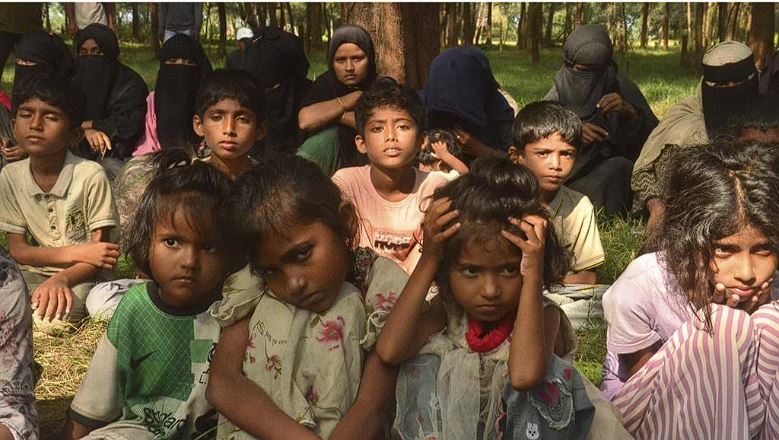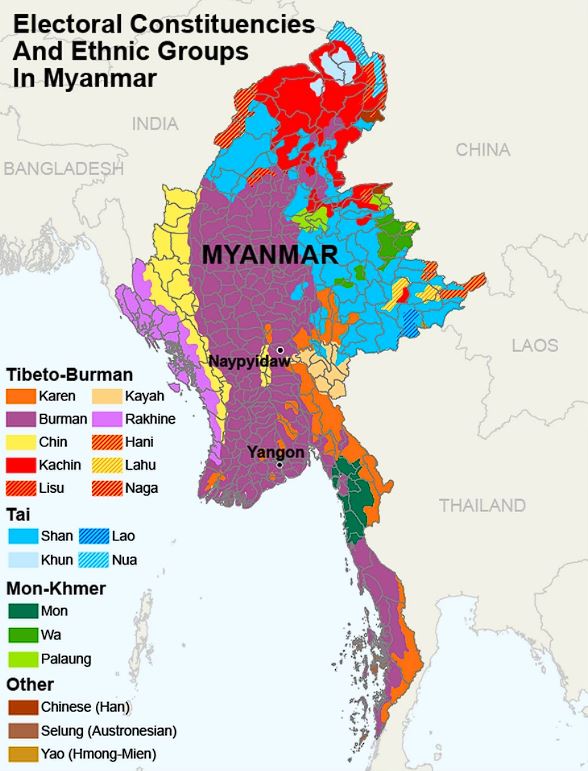
.
The civil war in Myanmar is spiralling out of control, in what the UNHCR describes as a “disintegration of human rights” at breakneck speed.
Largely out of sight of a global audience understandably preoccupied with Israel’s genocide in Gaza, the minority Rohingya Muslims are once again facing disaster: trapped between armies in Western Myanmar. Their plight (and those of other ethnic groups in Myanmar) must not be ignored again, lest there be a repeat of the ethnic cleansing and genocide of 2016.
Following recent articles on the Democratic Republic of Congo and Sudan, one can see many of the same hellish calling cards in Myanmar.
- A former British colony descending into chaos.
- A civil war between government forces and rebel militia.
- A fragile transition towards democratic rule violently ended by a military coup.
- Billions of dollars of illegal operations including trade in drugs, timber and wildlife that is both a cause of fighting and a source of funding for it.
- A brutal military dictatorship.
- External regional and global superpower meddling (in this case China and Russia who back the military Junta).
- Ethnic violence that descends into genocide.
- Millions of refugees.
- Forced conscription into the government military.
- The looming threat of famine.
- The studied disinterest of the Western powers who see no path to gaining anything of interest to them in Myanmar.
To even basically understand the current situation in Myanmar we are going to need an express history lesson.
Myanmar is a former British colony which gained its formal independence in 1948, ceding control to the majority Bamar ethnic group. Myanmar though has over 135 indigenous ethnic groups, grouped into eight national races: the majority Bamar (Burman), Kachin, Kayah, Karen, Chin, Mon, Rakhine and Shan.
The Burman majority is located in the centre of the nation where the major cities of Yangon and Mandaly are also located. The vast majority in Myanmar are Theravada Buddhists and most of them are also part of the Burman majority.
When non-Burman ethnic groups pushed for autonomy or federalism, the military leadership, which had (until recently) very lucrative business operations in the border regions, felt threatened and staged a coup d’état in 1962.
Successive military governments have viewed moves towards federalism and democracy as being a threat to their power, vested interests and a pre-amble towards the wholesale disintegration of Myanmar as a nation. A military Junta has been in direct and indirect control of Myanmar since the coup in 1962. Some Buddhist nationalists in Myanmar support the Junta as a bulwark against rival ethnicities and religions.
Between 1962 and 1974, Myanmar was ruled by a revolutionary socialist military council headed by General Ne Win, characterised by Soviet-style nationalisation and central planning.
From 1974-1988 the Burma Socialist Programme Party ruled over a one party state. Sporadic protests against military rule during the Ne Win years were almost always violently suppressed.
In 1988 widespread pro-democracy demonstrations throughout the country known as the 8888 Uprising saw thousands of demonstrators killed and a new military coup, with General Saw Maung forming the State Law and Order Restoration Council (SLORC) which subsequently declared martial law. The military government planned elections and changed the country’s official English name to the “Union of Myanmar”.
In May 1990 free multiparty elections were held for the first time in almost 30 years with the National League for Democracy (NLD) party of Aung San Suu Kyi winning a landslide majority. Aung San Suu Kyi won the Nobel Peace Prize for her fight for democracy in 1991. The military refused to hand over power though and nullified the elections claiming they were fraudulent. Aung San Suu Kyi (who had been detained before the elections) was to remain under house arrest until 2010, attracting global recognition as a political prisoner.
There was to be no repeat of the free 1990 general election until 2015. The pro-democracy NLD and Aung San Suu Kyi won another landslide victory. While Aung San Suu Kyi was constitutionally barred by virtue of her ethnicity from assuming the presidency, she created her own role of state counsellor, a role similar to a prime minister. The government in practice was an uneasy power sharing alliance with the military retaining control of its lucrative business operations and key cabinet posts.
The Burmese military were accused of committing ethnic cleansing and genocide towards the minority Muslim Rohingya people in 2016. The Rohingya have been persecuted on a regular basis by the military and Buddhist nationalists since the 1970’s. Aung San Suu Kyi lost most of her international support because she defended the military’s operations and led denials that they constituted genocide. Over a million Rohingya were forced to flee amidst widespread human rights abuses. An estimated 25,000 were killed, 116,000 beaten and over a million displaced.
After another victory for the NLD in the general elections of 2020, the military raised allegations (widely regarded as unfounded) of electoral fraud and they staged another coup on 1 February 2021 in which Aung San Suu Kyi and other members of the NLD were arrested. Aung San Suu Kyi remains in jail to this day.
Widespread national protests followed and after the military responded with lethal force, these became an armed insurrection with hundreds of pro-democracy militias, ethnic armies and local defense forces engaged in an increasingly savage war against the ruling military Junta.
Rebel forces have made significant progress and now control many areas of the country, with the military Junta’s control shrinking towards the centre and its major cities. Since the coup, the Armed Conflict Location and Event Data Project says that 50,000+ people have been killed, including at least 8,000 civilians. The human rights group Assistance Association for Political Prisoners (Burma) says that more than 26,500 people have been detained for opposing the government.
The Myanmar Peace Monitor says that the ruling military have launched airstrikes on over 900 days since the coup, often against civilian targets. The rebel militias have no access to air defences or air power, save for a limited number of handmade drones.
By the end of 2023, more than 2.6 million people had already been driven from their homes and the U.N estimates that more than 18 million people are now in desperate need of humanitarian assistance.
At the forefront of those in need of assistance are the Rohingya, feared to be trapped amid fighting in western Myanmar and with nowhere to flee:
“I am very concerned about the situation in Maungdaw. The Arakan Army this weekend gave all remaining residents – including a large Rohingya population – a warning to evacuate,” Volker Turk, the U.N. high commissioner for human rights, told the U.N. Human Rights Council in Geneva. Around 70,000 Rohingya in Maungdaw are trapped as the fighting draws closer.
A resident of Maungdaw said: “We have nowhere to go, no safe zone, not enough food and basic necessities, if they force us to leave, we will have no place to migrate.”
With a multi-billion dollar budget, modern weaponry including fighter jets, tanks, artillery and military grade drones, the military Junta will not easily be displaced and are stepping up counterattacks against rebel held towns, often proceeded by air strikes and devastating artillery bombardments. China and Russia support the Myanmar military although some accuse China of playing both sides (an echo of Russian involvement in Sudan).
All moral global citizens ought to speak out now before an unthinkably cruel fate engulfs millions in Myanmar, with the plight of the Rohingya a dreadfully urgent priority.
There is scant evidence in recent decades to shore up the West’s self-image as the selfless moral champions of truth, democracy and freedom; nevertheless it ought to be a no-brainer for the West to apply pressure on the ruling military in Myanmar to release its political prisoners and seek a settlement with pro-democracy forces that sees a peaceful transfer of power to a civilian administration.
Regardless of what the usual suspects do and the rank indifference of the corporate media, it will once again fall to the activist community across the world to raise the alarm about the deteriorating situation in Myanmar and to demand that the Rohingya are protected from another bloodbath. At the very least we must act so that nobody can say they haven’t been told. Those protesting for the Palestinians must also speak up for Myanmar and the Rohingya.

More Stories
Ukraine pays the price for the West’s addiction to propaganda over reality
Radical Friendship 2: Healing the divisive human need for certainty
Nobody should be surprised that Fascism is on the march across Europe.